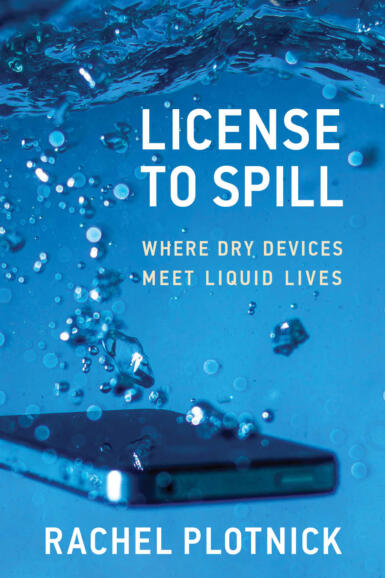Plotnick’s new book explores resilience in technological devices

Associate professor Rachel Plotnick published a new book investigating the everyday moments, activities, and spaces where media technologies and liquids collide.
The book, “License to Spill: Where Dry Devices Meet Liquid Lives,” considers how people’s experiences with media devices inevitably encounter wetness yet consumers take the blame when leaks, spillages, and overflows occur.
“There’s a lot of pressure to be a ‘good’ user who is exceptionally dry and takes ‘tender loving care’ of the things they own,” Plotnick said.
“But I try to point out throughout the book that life is hard and burdened by all kinds of (wet) conditions… It’s unrealistic to expect people to behave so carefully all the time and to incur great costs when damages occur.”
Plotnick began thinking about dirt and media back in 2019, and she was interested in how our bodies, environments, and practices mix with our devices. Though she started the work before the COVID-19 pandemic, she thought it became more urgent during that time because people became even more aware of germs and dirt in everyday life.
Plotnick’s initial research introduced another fascinating and understudied topic: liquids.
“I saw people talking online about all different kinds of wetness, from sweating on smartwatches while working out to spilling a cup of coffee on your laptop. It seemed like an exciting and important avenue to pursue because we all have some experience negotiating liquids with our technologies,” Plotnick said.

One of the biggest challenges when writing this book was deciding what to and what not to write about. There were many kinds of media technologies and liquids to study, and the book covers a long historical arc from the early 1900s to the present.
The research took Plotnick all the way to the Silicon Valley Archives at Standford University, where she looked at user newsletters, magazines, and the Apple archives to understand the relationship between drinks and computers. She also visited Duke University’s David M. Rubenstein special collections, looking at companies like Rolex and Kodak that have a history of trying to make their devices more water resistant.
“As more technologies have become water-resistant or waterproof, there are also more pressures to take our devices with us wherever we go – to the bathroom, the beach, the gym, the cafeteria, etc.,” Plotnick said.
She argues for the need for two conversations about liquids and technology: one that frees us of the stigma and shame associated with getting devices wet, and another one that considers the oversaturation of media in our everyday lives.
“Sometimes it’s nice to put down your phone and not bring it into the bathroom or have to eat your lunch while doing your work,” Plotnick said.
“License to Spill” was published by The MIT Press in 2025 and is available online for purchase.

